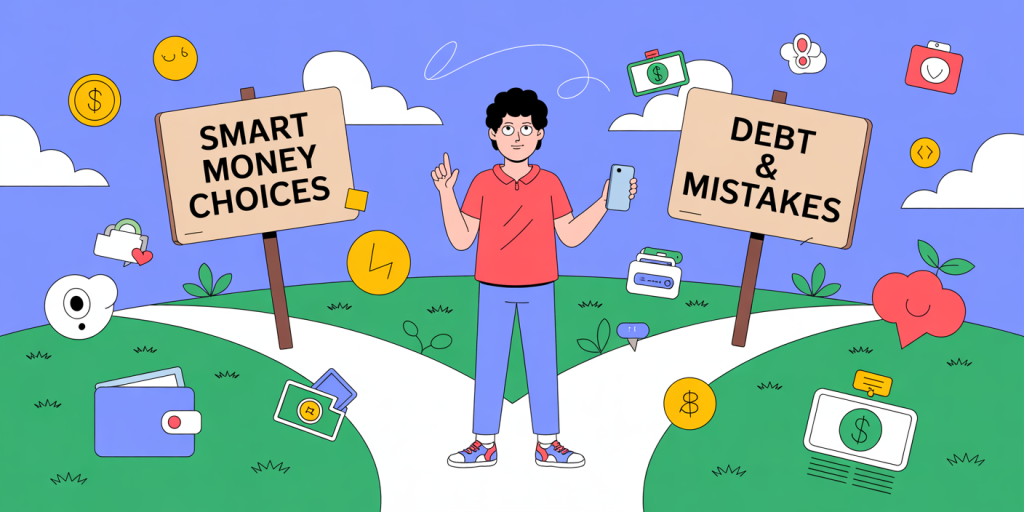Financial Literacy for Teenagers: Lessons Every Young Person Should Learn
Anúncios
In a world where money influences nearly every decision—from where we live to what we eat and how we spend our time—understanding personal finance is a crucial life skill. Yet, many teenagers enter adulthood without the foundational knowledge needed to manage money wisely. Without proper guidance, they’re more likely to fall into debt, overspend, or delay saving for important goals.
The solution? Financial literacy—the ability to understand and apply various financial skills, including budgeting, saving, investing, and managing credit. And the best time to start learning these lessons is during the teenage years.
This guide will walk through the essential financial lessons every teenager should learn to build a strong, responsible, and successful relationship with money.
Anúncios
1. Why Financial Literacy Matters for Teens

Teenagers are at a formative stage where habits—good or bad—begin to stick. With increased access to digital spending tools (like Venmo, Cash App, or debit cards), it’s easier than ever for young people to make financial decisions, often without fully understanding the consequences.
Anúncios
Financial literacy empowers teens to:
-
Make smart spending decisions
-
Avoid debt traps like payday loans or high-interest credit cards
-
Understand the value of saving early
-
Build independence and confidence
-
Prepare for financial milestones like college, a car, or their first job
2. How to Create a Simple Budget
One of the first money skills teens should master is budgeting—the process of creating a plan for how to use money.
Steps to Create a Teen-Friendly Budget:
-
Track Income
This includes allowance, part-time job wages, gift money, or side gigs (like babysitting or tutoring). -
List Expenses
Break down into categories: food, clothing, entertainment, subscriptions, transportation, etc. -
Set Spending Limits
Allocate realistic amounts to each category based on past spending. -
Set Goals
Include a savings goal—even if it’s $5 a week. It builds habit and discipline. -
Review and Adjust
Review the budget monthly and update it based on new priorities or income.
Tip: Use apps like BusyKid, Greenlight, or even a simple spreadsheet to practice budgeting in real time.
3. The Power of Saving Early
Saving is a financial superpower—especially when you start young.
Why Teens Should Save:
-
Build an emergency fund for unexpected expenses
-
Purchase larger items like a car, laptop, or concert tickets without debt
-
Learn delayed gratification
-
Start investing earlier and benefit from compound interest
Smart Saving Tips:
-
Set up a savings account (preferably one with interest)
-
Use the “pay yourself first” method: save before spending
-
Set specific savings goals (e.g., $500 for a new phone)
Even saving $10 per week consistently builds confidence and financial security.
4. Understanding Needs vs. Wants
Many money mistakes stem from confusing wants with needs.
Teaching the Difference:
-
Needs: Essentials like food, shelter, school supplies, basic clothing
-
Wants: Extras like designer shoes, video games, or takeout every day
Encourage teens to ask:
“Do I need this, or do I want it?”
“Can I afford this without going into debt?”
“Will this purchase still matter to me in a month?”
Practicing mindful spending helps curb impulsive buying and makes saving easier.
5. How Credit Works (and Why It Matters)
Credit is a tool—but if misused, it becomes a trap. Teens don’t need a credit card right away, but understanding how credit works will serve them for life.
Key Credit Concepts for Teens:
-
Credit Score: A number that shows how responsible you are with debt
-
Interest: What you pay extra when you borrow money
-
Credit Cards: Useful for building credit, but dangerous if not paid in full
-
Student Loans: A form of debt—know the risks and repayment plans
Smart Credit Habits:
-
Never spend more than you can pay off immediately
-
Always pay bills on time
-
Avoid borrowing for non-essential items
Tip: Parents can add responsible teens as authorized users on a credit card to begin building credit history.
6. The Basics of Banking
![]()
Understanding how to use a bank account is fundamental.
Teen Banking 101:
-
Checking Account: Used for daily transactions. Usually comes with a debit card.
-
Savings Account: Used for storing money long-term, may earn interest.
-
Direct Deposit: Have job income sent straight to your bank account.
-
Online Banking: Use mobile apps to check balances and transfer funds.
Teach teens how to read a bank statement, check for unauthorized charges, and avoid overdraft fees.
7. How to Earn and Manage Income
Financial literacy isn’t just about saving—it’s about earning too.
Ways Teens Can Earn Money:
-
Part-time jobs (retail, food service, internships)
-
Freelance skills (graphic design, tutoring, photography)
-
Gig work (dog walking, babysitting, lawn care)
-
Online platforms (Etsy, Fiverr, content creation)
Once income starts flowing, teens should:
-
Budget it wisely
-
Split it between spending, saving, and giving
-
Learn to track time and effort vs. reward (work smarter)
8. Introduction to Investing and Compound Interest
Investing may sound intimidating, but teens who understand the basics gain a serious head start.
What to Know:
-
Investing means putting money into something (like stocks) with the goal of it growing over time.
-
Compound Interest is when your investment earns interest, and then that interest earns more interest.
Example:
If a teen invests $1,000 at age 16 and earns an average of 7% annual return, it grows to over $10,000 by age 46—without adding more.
Tools like custodial IRAs and stock market simulators can help teens get familiar with investing early on.
9. Avoiding Debt Traps
Debt is one of the biggest challenges facing young adults. Teens must understand the risks before they face credit card offers or student loans.
Common Teen Debt Pitfalls:
-
Overspending with credit cards
-
Ignoring payment deadlines
-
Taking out unnecessary student loans
How to Avoid:
-
Borrow only what you can repay
-
Pay in full and on time
-
Focus on building savings instead of relying on credit
Educating teens early can prevent costly mistakes later in life.
10. Giving Back and Financial Generosity
Money isn’t just about personal gain—it’s also a tool for doing good.
Teaching teens to donate, volunteer, or support causes they care about builds empathy and social responsibility.
Even small contributions—like donating part of a paycheck or volunteering for a financial literacy group—foster a healthy relationship with wealth.
11. Setting SMART Financial Goals
Teens should learn how to set goals that are:
-
Specific: “Save $300 for a new bike”
-
Measurable: Track progress each week
-
Achievable: Set realistic targets
-
Relevant: Align with personal priorities
-
Time-bound: Have a deadline like “in 3 months”
Writing goals down and reviewing them regularly builds financial accountability.
12. Financial Mistakes Are Learning Opportunities
No one gets everything right the first time. Teens should understand that mistakes are part of the process—as long as they learn from them.
Missed a payment? Overspent on clothes? Forgot to track a budget?
Talk about it, fix it, and move forward. Resilience is as important as knowledge in building lifelong financial health.
Final Thoughts

Teaching teenagers financial literacy isn’t just about numbers—it’s about preparing them for the real world. With the right lessons and tools, teens can become financially confident adults who make smart decisions, avoid debt, and achieve long-term success.
Encourage teenagers to start small: create a budget, open a savings account, and set one financial goal. Build from there. Over time, those small habits will form the foundation of a lifetime of financial well-being.
Because the earlier you understand money, the better your future can be.
Post Comment